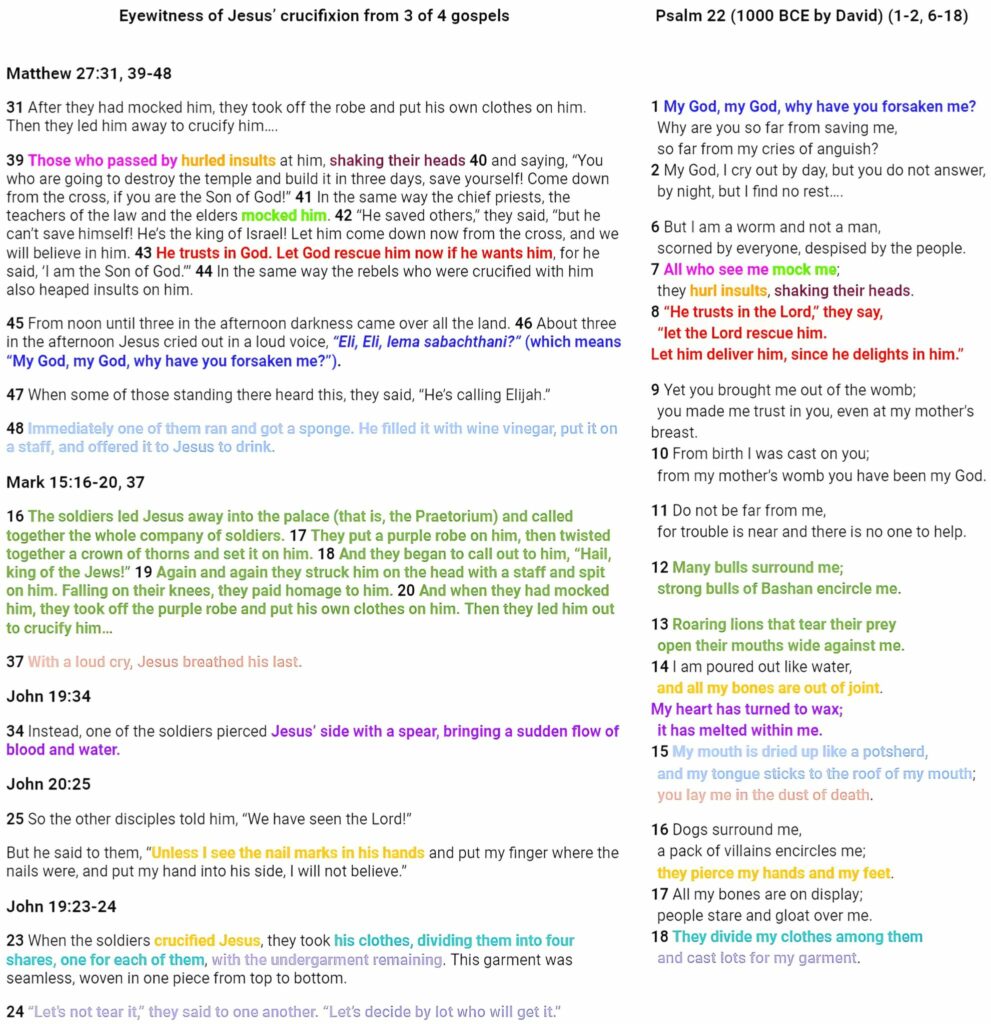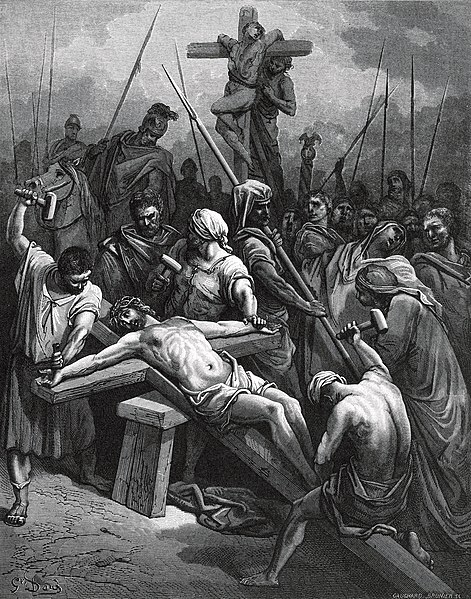A few years ago a work colleague, J, wandered to my desk. J was smart and educated – and definitely not a follower of the Brit Chadasha. But he was somewhat curious about it so we had some warm and open conversations between us. He had never really looked at the Bible so I had encouraged him to investigate it.
One day he came into my office with a Bible to show that he was taking a look. He had opened it randomly in the middle. I asked him what he was reading. Our conversation went something like this.
“I am reading in Psalm chapter 22”, he said
“Really”, I said. “Any idea what you are reading about?”
“I guess I am reading about the crucifixion of Jesus”, J replied.
“That’s a good guess”, I laughed. “But you are about one thousand years too early. Psalm 22 was written by King David around 1000 BCE. Jesus’ crucifixion was in 30’s C.E. one thousand years later”.
The Psalms…
J did not realize that the Psalms were not the gospel accounts of Yeshua’s life written by his contemporaries. Psalms are sacred Hebrew hymns written 1000 years before Yeshua primarily by King David. J had only heard some stories about Yeshua, including his crucifixion, and randomly opening his Bible, read what seemed to describe the crucifixion. Not knowing any better, he just assumed it was the story of the crucifixion which many around the world remember annually on Good Friday. We had a chuckle over his first mis-step in Bible reading.

Then I asked J what he saw in Psalm 22 that made him think he was reading about Yeshua’s crucifixion. Thus began our little study. I invite you to consider some of the similarities J noticed by placing the passages side-by-side in a table. The eye-witness accounts of the crucifixion recorded in the Gospels are on the left. Psalm 22 is on the right side. To help catch the connections within the many words I have color matched the similar texts. (Click here for enlarged print version).
Comparison of Gospel accounts of the Crucifixion with the details in Psalm 22

That J made the logical but wrong conclusion that Psalm 22 was an eye-witness account of Yeshua’s crucifixion, should make us ask a question.
How do we explain the similarity between the crucifixion accounts and Psalm 22?
Is it coincidence that the details match so precisely that both Psalm 22 and the Gospels divide the clothes. But both also cast lots. (tearing seamless garment would destroy it so the soldiers gambled for it). Psalm 22 was written before crucifixion was invented yet it describes various details of it (piercing of hands and feet, bones being out of joint – by being stretched as the victim hangs).
In addition, the Gospel of John states that blood and water flowed out when soldiers thrust a spear in Yeshua’s side. This indicated a fluid buildup around the heart. Yeshua thus died of a heart attack. This matches the Psalm 22 description of ‘my heart has turned to wax’.
Psalm 22 reads like a first-person account of a person undergoing crucifixion. The gospels read like third-person eye-witness accounts. And both sets match
How so?
G-d Inspired Explanation for Psalm 22
Yeshua, in the Gospels, argued that these similarities were prophetic. G-d inspired the prophets hundreds of years prior to Yeshua’s life to predict details of his life and death so that we can know that this was all in the plan of G-d. Prophetic fulfillment would be like leaving Divine fingerprints on these events of that Passover since no human could foresee the future in such detail. This is evidence of G-d’s work and intervention in history.
Naturalistic Explanation for Psalm 22
Others argue that the similarity of Psalm 22 with crucifixion events is because the Gospel writers made up the events to ‘fit’ the prophecy. But this explanation totally ignores the testimony of historians from that time outside of the Bible. Josephus and Tacitus, historians living in that same era as Yeshua, respectively tell us that:
“At this time there was a wise man … Jesus. … good, and … virtuous. And many people from among the Jews and the other nations became his disciples. Pilate condemned Him to be crucified and to die.”Josephus. 90CE. Antiquities xviii. 33. Josephus was a Jewish Historian
“Christus, the founder of the name, was put to death by Pontius Pilate, procurator of Judea in the reign of Tiberius”Tacitus. 117 CE. Annals XV. 44. Tacitus was a Roman Historian
Their historical testimony agrees with the Gospels that Yeshua was crucified. This is important because many of the details in Psalm 22 are simply particulars of the act of being crucified. If the gospel writers were going to make up the actual events to make them ‘fit’ Psalm 22 then they would basically have had to make up the whole crucifixion. But the Jewish historian Josephus explicitly states that Pilate did crucify him.

Psalm 22 and Yeshua’s legacy
Also, Psalm 22 does not end at verse 18 as in the table above. It continues on. Note the triumphant mood at the end –after the person dies!
The poor will eat and be satisfied;
those who seek the Lord will praise him—
may your hearts live forever!27 All the ends of the earth
will remember and turn to the Lord,
and all the families of the nations
will bow down before him,
28 for dominion belongs to the Lord
and he rules over the nations.29 All the rich of the earth will feast and worship;
all who go down to the dust will kneel before him—
those who cannot keep themselves alive.
30 Posterity will serve him;
future generations will be told about the Lord.
31 They will proclaim his righteousness,
declaring to a people yet unborn:
He has done it!Psalm 22:26-31
This is not talking about the details of events of this person’s death. The beginning of Psalm 22 dealt with those details. The psalmist is now addressing the legacy of that person’s death with ‘posterity’ and ‘future generations’ (v.30).
Who would that be?
Psalm 22 foresaw Yeshua’s legacy to our time
That is us living 2000 years after Yeshua’s crucifixion. The Psalmist predicts that the ‘posterity’ which follows this ‘pierced’ man dieing such a horrible death will ‘serve’ him and be ‘told about him’. Verse 27 predicts the geographic scope of the impact. It will go to the ‘ends of the earth’ and among ‘all families of nations’ to cause them to ‘turn to the LORD’. Verse 29 predicts that ‘those who cannot keep themselves alive’ (since we are mortal that means all of us) will one day kneel before him. The righteousness of this man will be proclaimed to people who were not yet alive (the ‘yet unborn’) at the time of his death.
Psalm 22’s conclusion has nothing to do with whether the gospel accounts borrowed from it or made up the crucifixion events because it is now dealing with a much later era – that of our time. The gospel writers, living in the 1st century could not ‘make up’ the impact of the death of Yeshua down to our time. How could they know what that impact would be?
When G-d called Abraham He promised that:
‘all peoples on earth will be blessed through you’Genesis 12:3
The Prophet Isaiah had prophesied that the Jews would become a
‘light for the Gentiles’Isaiah 42:6
The prophetic scope throughout the Tanakh has always been that the Jews would bless all the nations. But when these promises were written down these nations worshiped idols and lived under a ‘might-makes-right’ ethic. Since then Western Civilization has arisen which has adopted a monotheistic ‘live under law’ ethos. And so, these promises have been fulfilled. But think about how it happened. The nations and peoples never became directly curious about Moses and began studying the Torah. No, they were drawn to the person of Yeshua, and in that context the nations were also introduced to Moses and Law. Yeshua was the historical influence that caused the fulfillment of the promise to Abraham and Isaiah. Like my friend J, the nations only opened the Bible because of Yeshua.
We see this similarly play out in the same way with Psalm 22’s concluding vision. The scope includes the entire Global mosaic of today and we see that Yeshua fits that scope.
One could not make a better prediction of the legacy of Yeshua than Psalm 22 does. Even simply noting annual worldwide Good Friday celebrations remind us of his global impact two thousand years after his death. These fulfill the conclusion of Psalm 22 as precisely as the earlier verses predicted the details of his death.
Who else in world history can make a claim that details of his death as well as the legacy of his life into the distant future would be predicted 1000 years before he lived?
Scratching Below the surface.
Perhaps, like my friend J, you will take the opportunity to consider the meaning of the death and resurrection of Yeshua. It will take some mental effort. But it is worthwhile because the man Psalm 22 foresaw promised:
I have come that they may have life, and have it to the full.
John 10:10
Some ways to do this: